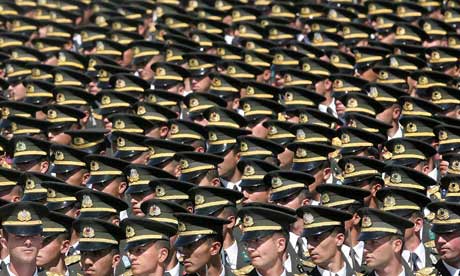
Turkey’s Law on Military Service Exemption
Publication: Eurasia Daily Monitor Volume: 8 Issue: 230
By:

On November 30, the Turkish Grand National Assembly passed a law that will allow citizens born before 1983 to avoid military service upon the payment of an exemption. Starting by January 1, 2012, those who comply with the requirements will have a six month-period to pay the equivalent of $16,000 in order to be fully exempted from enlistment (Today’s Zaman, November 30).
On the week preceding the Parliament’s vote, the bill, brought forward by the ruling Development and Justice Party (AKP), attracted criticism from all main opposition parties. The secularist Republican People’s Party (CHP), despite being in favor of an exemption, stressed how the high price set by the government is likely to constitute a problem for all families but the wealthiest ones, asking to submit the bill to a referendum, in order to let voters express themselves on the issue. Similarly, Nationalist Action Party (MHP) leader Devlet Bahceli stated he found the law discriminatory for poor families. He also asked for a revision of the length of military service and called for a new and different political approach toward the management of military personnel. The pro-Kurdish Peace and Democracy Party (BDP) criticized both the age limit and the high price, but it also used the opportunity to reinteroduce, unsuccessfully, the issue of conscientious objection, still unrecognized by Turkish law (SES Turkiye, December 02).
But criticism by opposition parties was overshadowed by military opposition to the bill. Already in May, during the electoral campaign for the 2011 general elections, CHP proposed to shorten the length of compulsory military service and to allow paid exemption from military service as an option (more or less the bill AKP implemented), meeting the military top echelons’ strong criticism (Today’s Zaman, May 23). Now, despite having been quite reserved since his recent promotion to Chief of General Staff, Gen. Necdet Ozel showed growing opposition to AKP’s bill proposal. He first voiced his concern in early November, highlighting how decisions regarding an exemption from military service should have been taken according to people’s sensitivities. Then, on November 21, the day before Prime Minister Recep Tayyip Erdogan announced the details of AKP’s bill, the Turkish General Staff made the cryptic move of divulging, for the first time in the country’s history, its armed forces’ personnel numbers (Hurriyet Daily News, November 21).
The meaningfulness of this move seems to lie within the social significance of military service in Turkey. Article 72 of the Turkish Constitution states that national service is a right and a duty for every Turk, and it must be performed according to the relevant law, which specifies that every male citizen is obliged to undergo military service. Serving in the military is generally considered a moral duty (in line with the traditional principle according to which ‘every Turk is born a soldier’), and a fundamental rite toward adulthood for the Turkish youth. Those who are unfit for military service are often referred to as ‘curuk,’ or rotten. Biases toward those who have not been enlisted are so deeply rooted in Turkish culture that during the last electoral campaign, Prime Minister Erdogan sarcastically questioned whether his main competitor for premiership, CHP’s leader Kemal Kilicdaroglu, had actually fulfilled his duties with the military service, while Kilicdaroglu hit back stigmatizing the fact that Erdogan’s son avoided enlistment by taking advantage of a previous law for paid exemption (Hurriyet Daily News, March 15). The significance of personnel numbers’ disclosure seems then to move along this line: by showing that Turkish armed forces count on more than 460,000 conscripts, making up for almost 65 percent of military personnel, the Turkish General Staff wanted to reassert the principle of military service as a sacred duty, showing how common Turks are still the backbone of the country’s armed forces, while, once again, condemning the idea of a paid exemption. Military opposition notwithstanding, the Parliament passed the bill. According to governmental estimates, the exemption will bring in revenue of roughly $1.3 billion, which should be reinvested in social services for veterans, terrorism victims and possibly for helping the earthquake stricken population of Van (SES Turkiye, December 02).
The debate on this minor and temporary change to the conscription system reflects how reluctant the Turkish military is to reforming efforts. In functional terms, the exemption will have no effect whatsoever on the Turkish armed forces’ effectiveness, so criticism from the military seemed quite inappropriate. Moreover, the Turkish military system is still lagging behind in some reforms whose implementation is a mere question of timeliness and political resolution, rather than opportunity, such as the provision of legal recognition of the status of conscientious objector, or initiating the transition toward an all-volunteer force. The staunch opposition showed by the military on a marginal issue such as the law on military exemption, not to mention its outspoken opposition to conscientious objection (Today’s Zaman, May 23), should give decision-makers a hint of what they should expect from the generals when discussing military-related reforms in the future.




